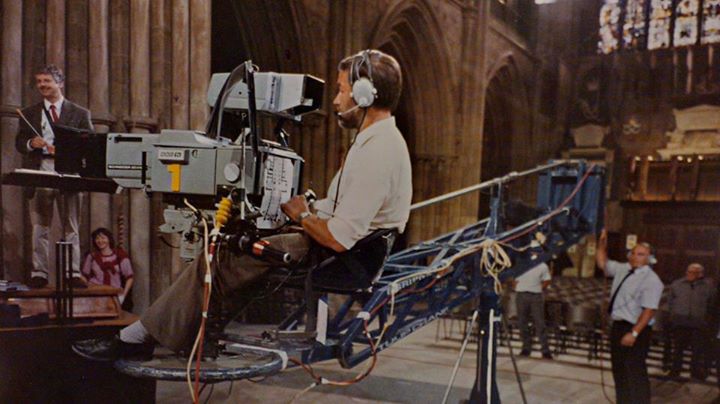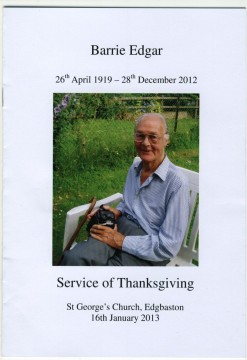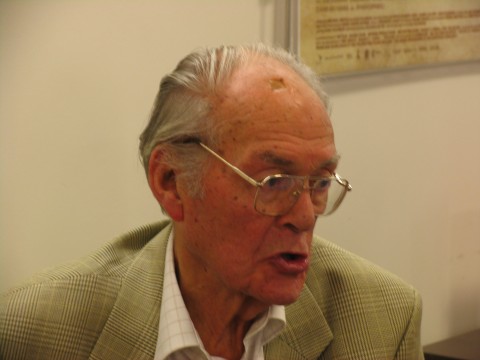(Here is the continuation of Colin Pierpoint’s blog about his BBC career).
I did 5 days in Wales for Songs of Praise to BBC Wales from St Asaph. Several days in Hastings for a cricket OB. (A great moment here. There was a delay in setting up the link signal which was received at Swains Lane in North London. The London Comms Engineer there said on the RT (Radio telephone) “I suppose we are waiting for Birmingham are we?” So Paul in the Birmingham links van replied “No, actually we are waiting for the London Links van to arrive”! I did a link at the Oval Cricket Ground for a test match, working late into the night sending VTR recorded on site to the Television Centre VT. And of course I did Edgbaston several times (My first ever radiolink which was a bit of a disaster! The Cricket Ground were having a management meeting when we arrived for the Vision Circuit Test and they had all parked where the links van should be. I sent requests to move their cars but they would not come out. Our van was one from Wales and all the mains sockets were different from ours!) I also did the radiolink for the opening of the National Exhibition Centre (NEC) by the Queen [see comment at the bottom of this post]. It was freezing cold with snow on the ground and I had to stand outside CMCR9 with a field telephone in my hand for ages, doing a lines test which had problems. It was at the NEC on a later OB that I was ordered off the site by the Shop Steward because I was not a member of the ABS (Association of Broadcasting Staff). I went to tell the Engineering Manager in the scanner (CMCR) first, who agreed that it was best if I leave, and then reported it to the CPE in Pebble Mill. In fact, all I had missed was the derig and making the tea for our rigger-driver! It was the Rigger-Driver Jim, who asked me to leave! He should have waited until I finished making his tea before he told me.
There was one cricket match Television OB while the BBC were having strike action. Sound was cut for some programmes but not all. The Engineering Manager came to my links van and said “What action have you taken to ensure that our sound is not cut?” So I said that on yesterday’s cricket match from somewhere else (not mine) the OB had rung the Television Centre and said can you guarantee that our sound will not be cut? So they cut it! I told the EM that because of this I was keeping my head down. He said “Good Idea” and our sound was not cut. (Although I was not in the union at that time, I did contribute to the strike fund. Later I also joined BECTU trade union at Wood Norton and did go on strike for one day in support of my colleagues). I also did a midpoint at Daventry Transmitter site; it was only a test in case of London flooding, but a chance to talk to my transmitter colleagues.
Sometimes we operated a repeater inside the telephone exchange. This is a box of BBC equipment used to correct the frequency response before it is passed on to the nearest BBC centre. (Later this was stopped when the Post Office union decided that their staff should do it). I did repeaters in Kettering, Coventry, Hanley and Shrewsbury. I did the repeater for the famous broadcast for the BBC anniversary at Sudley Castle. Very embarrassing!
You will remember that I preferred to take the Comms self-drive car for lines tests. My own Land Rover was getting rather elderly and unreliable at the time and if it brike down on official dury, it would have been my fault. So I thought that by using the Comms Department car there would be no problem if it stopped working. How wrong I was! At Burghley Park for the horse trials I took the self drive car which did break down! I was crossing the course near the finishing post when the engine stopped half way across the track; right where the horses would be finishing the event! An image entered my mind of people at Pebble Mill watching the trials on BBC2 as the horses went round an abandoned car at the finishing post, saying “Isn’t that the Comms Self drive car?” So I rang the transport office Neville Mowl and they called out the AA. It seems that I had flooded the carbuettor with an automatic choke (Ford Escourt). The AA man told me that I should have told him where I was and not where the car was, but I had to move about and get on with testing the cross course cables as there was less than an hour to transmission.
An interesting lines test was at Holme Pierrepont, the national watersport centre. The man on the gate let me in a few times, and then said “You have been through here too often today, I am not letting you in again”! So I showed him my BBC pass. When he saw the name Pierpoint, he thought there was a fiddle somewhere but couldn’t quite put his finger on it. Meanwhile, the Post Office Engineer, who I was working with, went in and out past me without being stopped once!
Colin Pierpoint
The following comment was left on the Pebble Mill Facebook page:
Malcolm Hickman: ‘Jim Lloyd and I were stood by the link on the roof of the NEC because it was a grade 1. It was hissing down, so we took shelter in a walkway that crossed the roof. There were 2 men stationed there who were in suits and they had shoulder holsters with guns. We could see a semicircle of people inside the building at the end of the walkway. We did look a bit scruffy in rigging jackets and duffle coat and as the queen got a bit closer, they told us to get out, so we never actually got to shake hands.’




